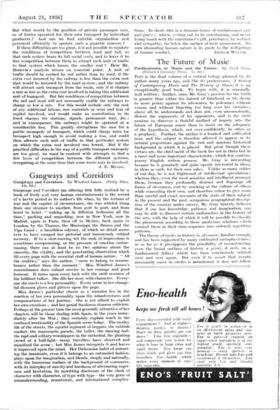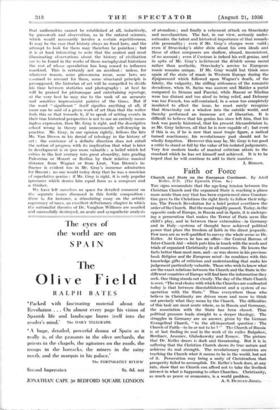The Future of Music
Predicaments, or Music and the Future. By Cecil Cray. (Oxford University Press. ie. 6d.) Tots is the final volume of a critical trilogy planned by its author many years ago, and like its predecessors, .1 Survey of Contemporary Music and The History of Music, it is an exceptionally good book. To begin with, it is unusually well written ; further, since Mr. Gray's passion for the truth is greater than either his hatred of falsehood or his desire to score points against its advocates, he potemises without venom and without lingering too long over his victories ; above all, he understands and does not, even unconsciously, distort the arguments of his opponents, and is far more anxious to discover a fruitful method of inquiry into the future of European music than to insist on the adequacy of the hypothesis, which, not over-confidently, he offers as a prophecy. Further, the author is a learned and cultivated man, and the subject is therefore allowed to appear in its natural proportions against the rich and spacious historical background in which it is placed. But great though these virtues are, the chief merit of the book lies not in them but in a rarer and more important characteristic, which few contem- porary English writers possess. Mr. Gray is interesting because he is genuinely and quite openly interested in ideas, in ideas as such, for their own sakes. Unlike so many critics of our day, he is not frightened of intellectual speculation ; whereas they, even the most sensitive and intelligent amongst them, because they profoundly distrust and disparage all forms of cleverness, end by mocking at the culture of others white concealing their own, and therefore refuse to give more than careful and exact accounts of the state of their subject in the present and the past, scrupulous geographical descrip- tion of the country under survey, Mr. Gray bravely believes that if one has knowledge, patience and imagination, one may be able to discover certain uniformities in the history of the arts, with the help of which it will be possible to classify the phenomena according to those unabvious relations which connect them in their time-sequence into ordered, repetitive patterns.
The theory of cycles in history is, of course, familiar enough, and has been supported by many celebrated metaphysicians ; in so far as it presupposes the possibility of reconstructing even the broad outlines of history a priori, it rests on a fundamental fallacy which has been conclusively refuted over and over again. But even if to assert that events necessarily move in circles is nonsensical. it does not follow that uniformities cannot be established at all, inductively, by guesswork and observation, as in the natural sciences, which would necessarily involve a certain repetitiveness. It may be the case that history obeys no fixed laws, and the attempt to look for them may therefore be pointless ; but it is at least interesting to note that the acutest and most illuminating observations about the history of civilisation are to be found in the works of those metaphysical historians the rest of whose speculation has long ceased to influence mankind. This is certainly not an accident : unless, for whatever reason, some phenomena recur, some laws are assumed to account for them, some structural principle is presupposed, the historian of art will be compelled to divide his time between statistics and photography : at best he will be praised for picturesque and entertaining reportage, at the very best he may rise to the rank of an accurate and sensitive impressionist painter of the times. But if the word " significant " itself signifies anything at all, if more can be said of a given work of art than that the writer feels this or that towards it, if to speak of setting events in their true historical perspective is not to use an entirely mean- ingless expression, then Mr. Gray is right, and the descriptive school wrong in theory and unnecessarily self-denying in practice. Mr. Gray, in our opinion rightly, follows the late Mr. Van Dieren in his denial of teleology in the history of art ; the existence of a definite direction does not entail the notion of progress with its implication that what is later in development is eo ipso more valuable : a belief which led critics in the last century into great absurdity, into grading Palestrina or Mozart or Berlioz by their relative musical distance from Wagner or from Liszt. Van Dieren's in- fluence is evident too in Mr. Gray's immense admiration for Busoni ; no one would today deny that he was a musician of superlative genius : if Mr. Gray is right, it is only popular ignorance which denies him equal fame as a composer and thinker.
We have left ourselves no space for detailed comment on the separate issues discussed in this fertile composition : there is, for instance, a stimulating essay on the artistic supremacy of races, an excellent deflationary chapter in which the nationalist theories of Dr. Vaughan Williams are assailed and successfully destroyed, an acute and sympathetic analysis
of atonalism ; and finally a vehement attack on Stravinsky and neo-classicism. The last, in our view, seriously under- estimates the talent and historical importance of that remark- able personality ; even if Mr. Gray's charges were valid ; even if Stravinsky's obiter dicta about his own ideals and those of other composers are shallow, absurd, inconsistent, of no account ; even if Cocteau is indeed-his evil genius, and in spite of Mr. Gray's indictment the debacle seems moral rather than aesthetic, Stravinsky's service to European music remains unique. If Mr. Gray would but think once again of the state of music in Western Europe during the Epigonenzeit which followed upon Wagner's death, of the falsity, the vulgarity, the stifling airlessness of the romantic decadence, when St. Satins was austere and Mahler a purist compared to Strauss and Puccini, while Busoni or Sibelius were too distant and too aloof to bring relief, and Debussy was too French, too self-contained, in a sense too completely insulated to affect the issue, he must surely recognise that Stravinsky cut a window into the outside world, and thereby performed an immense act of liberation. It is difficult to believe that his genius has since left him, that his task was purely historical, that his present Alexandrinism is, as Mr. Gray believes, all that he is now capable of ; but even' if this is so, if he is now that most tragic figure, a radical turned reactionary, his revolutionary past should not be wholly forgotten. However this may be, Mr. Gray is too good a critic to stand or fall by the value of his isolated judgements. Very few modern books of musical criticism attain to the standard which he has set himself and achieved. It is to be
hoped that he will continue to add to their number. '
I. BERLIN.







































 Previous page
Previous page